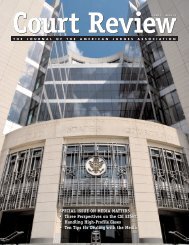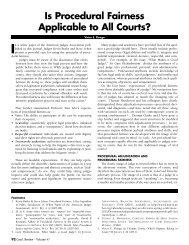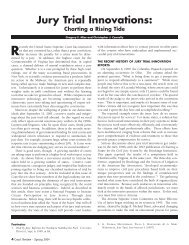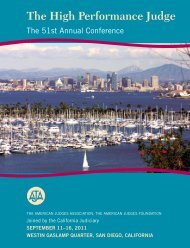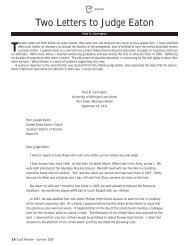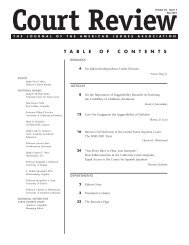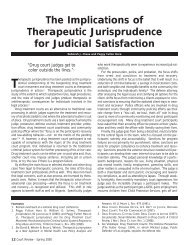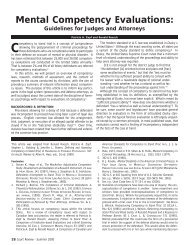doubt that aspirati<strong>on</strong>s for, and satisfacti<strong>on</strong> with, particular outcomesreign supreme in litigants’ minds. Distributive justicemight not be litigants’ favorite justice flavor, but it is the flavorthey care about the most. It is therefore the flavor that judgesshould care about the most as well.Procedures of the utmost fairness do not necessarily meanthat litigants will readily accept a court’s outcome or decisi<strong>on</strong>.Hence it is important for legal advisors, professi<strong>on</strong>als, andjudges to be willing to explain outcomes and to express a willingnessto answer litigants’ questi<strong>on</strong>s, particularly if an outcomeis undesirable or unexpected. As menti<strong>on</strong>ed in the individualdifferences secti<strong>on</strong>, supra, it is important further forlegal professi<strong>on</strong>als to recognize that litigants are not cookiecutterreplicas. What makes people different will also influencehow they approach, interpret, and understand the law. Thiswill help to ensure that litigants have a better understanding oftheir outcomes and why those particular outcomes werereached, which would potentially lead to greater satisfacti<strong>on</strong>with the justice system and fewer appeals.Burke and Leben also emphasize the importance of socialscience research in helping legal professi<strong>on</strong>als understand howthe general populati<strong>on</strong> interprets fairness in the legal system.We support this propositi<strong>on</strong> with respect to distributive, aswell as procedural fairness. We similarly recommend that legalprofessi<strong>on</strong>als not <strong>on</strong>ly educate themselves by becoming familiarwith the existing literature, but also support <strong>on</strong>goingresearch. There are two ways in which judges can facilitate thisgoal. First, they can allow researchers to survey litigants abouttheir percepti<strong>on</strong> of legal outcomes as well as legal procedures.Sec<strong>on</strong>d, they can serve as research participants themselves.Social scientists who c<strong>on</strong>duct research <strong>on</strong> the legal systemknow much less about how judges make decisi<strong>on</strong>s than theydo about how juries (and especially individual jurors) makedecisi<strong>on</strong>s. This state of affairs exists for a number of reas<strong>on</strong>s,but primarily because compared to the average juror (or mockjuror), judges are fewer, busier, harder to obtain access to, andless swayed by offers of token compensati<strong>on</strong> for participatingin research studies.As fact finders, judges and juries are similar in manyrespects, yet they differ in subtle ways as well. 43 <strong>Judges</strong> differfrom jurors in terms of their training, background, legalknowledge, and experience with similar cases; evidentiaryrules also mean that judges might make decisi<strong>on</strong>s <strong>on</strong> slightlydifferent c<strong>on</strong>stellati<strong>on</strong>s of facts than juries. Moreover, preciselybecause of their experience and training, judges are muchmore likely than jurors to have reflected <strong>on</strong> the nature of theirtask and to have formulated principles to which they adhere inadjudicating the cases before them. Interviews with judges, aswell as judge-jury comparis<strong>on</strong>s, could shed a great deal of light<strong>on</strong> the justice principles that legal fact finders rely <strong>on</strong> in determiningtrial outcomes. Reflecti<strong>on</strong> by judges <strong>on</strong> the principlesand goals that they use, often unc<strong>on</strong>sciously, in reaching verdictswould produce a more thoughtful and better informedjudiciary.Brian H. Bornstein, Ph.D. (University ofPennsylvania), M.L.S. (University ofNebraska), is Professor of Psychology andCourtesy Professor of Law at the University ofNebraska-Lincoln, where he is AssociateDirector of the Law-Psychology Program. Hismain research interests are jury decisi<strong>on</strong> making,eyewitness testim<strong>on</strong>y, and percepti<strong>on</strong>s ofjustice. He can be reached at bbornstein2@unl.edu.Hannah Dietrich (M.A.) is a doctoral student atthe University of Nebraska—Lincoln in the jointSocial Psychology PhD and Master of LegalStudies program. She can be reached at hl.dietrich@gmail.com.43. See, e.g., Brian H. Bornstein, <strong>Judges</strong> vs. Juries, 43 CT. REV. 56(2006).Court Review - Volume 44 77
C ESSAYAdding Color to the White Paper:Time for a Robust Reciprocal Relati<strong>on</strong>ship Between<strong>Procedural</strong> Justice and Therapeutic JurisprudenceDavid B. WexlerINTRODUCTION<strong>Judges</strong> Kevin Burke and Steve Leben, in <strong>Procedural</strong> <strong>Fairness</strong>:A Key Ingredient in Public Satisfacti<strong>on</strong>, 1 have produced a mostimpressive White Paper. It is handy, brief, crisp, readable, andimmensely practical.The document draws <strong>on</strong>, and makes most accessible, theresearch <strong>on</strong> procedural justice, dem<strong>on</strong>strating c<strong>on</strong>vincinglythe importance of judges understanding and implementing intheir courtrooms c<strong>on</strong>cepts such as “voice” and “respect.”<strong>Judges</strong> Burke and Leben claim procedural justice to be “the”critical element in public trust and c<strong>on</strong>fidence regarding thecourt system. They note, too, the role procedural fairnesslikely plays in increased compliance with court orders andeven in reduced recidivism.The latter c<strong>on</strong>tenti<strong>on</strong> – regarding compliance and reducedrecidivism – is an area where the literature of procedural justicespills over substantially into the related and indeed overlappingarea of therapeutic jurisprudence (TJ). The presentessay argues that therapeutic jurisprudence is “the” critical elementin how courts can reduce re-offending, 2 and urges thatjudges should similarly familiarize themselves with that area, aprocess that, like the introducti<strong>on</strong> to procedural fairness, canalso begin by judges perusing a few key sources and websites. 3In fact, there is a perfect single-source TJ counterpart to,and compani<strong>on</strong> for, the procedural fairness White Paper. Inthe beginning of their White Paper, <strong>Judges</strong> Burke and Lebennote that the <strong>American</strong> <strong>Judges</strong> Associati<strong>on</strong> has about 150members in Canada and that “although we make no recommendati<strong>on</strong>sregarding the courts of Canada, we believe that thebaseline social-science research up<strong>on</strong> which this paper is basedwould also be applicable there, given the similarities betweenthe legal systems of these two countries.” 4 As it turns out, theTJ compani<strong>on</strong> to which I am referring is a handy, brief (about50 pages), crisp, readable and immensely practical judicialmanual, available <strong>on</strong>line, 5 produced in 2005 by the Nati<strong>on</strong>alJudicial Institute of Canada (and spearheaded by Justice PaulBentley of the Tor<strong>on</strong>to Drug Treatment Court), and entitledJudging for the 21 st Century: A Problem-Solving Approach. 6THERAPEUTIC JURISPRUDENCETJ’s view of the law as a potential therapeutic agent – and oflaw as <strong>on</strong>e of the helping/healing professi<strong>on</strong>s – leads it tosearch for promising developments in the behavioral sciencesand to think creatively about how those developments mightbe imported into the legal system without offending dueprocess and related justice goals. Accordingly, TJ has profitablyemployed insights regarding relapse preventi<strong>on</strong> planning,health care compliance, and the reinforcing of law-abidingbehavior. 7Naturally, procedural justice has been high <strong>on</strong> TJ’s list ofhighly pertinent branches of social science inquiry. This is now<strong>on</strong>der, given the relati<strong>on</strong>ship and close c<strong>on</strong>necti<strong>on</strong> betweenprocedural fairness and therapeutic c<strong>on</strong>sequences.In the area of civil commitment, for example, proceduralfairness at a commitment hearing is likely to increase a resp<strong>on</strong>dent’sacceptance of a judicial order of commitment as well asa patient’s cooperativeness with treatment professi<strong>on</strong>als andwith the taking of recommended medicati<strong>on</strong>s. 8 In the criminallaw c<strong>on</strong>text, procedural fairness factors also affect an offender’sreadiness for rehabilitati<strong>on</strong>, and unfairness may indeed lead toa “defiance” effect and increased offending. 9A. BEYOND PROCEDURAL FAIRNESSIn criminal law matters, therefore, TJ often draws heavily <strong>on</strong>the psychology of procedural justice. But it then typicallydraws <strong>on</strong> some other psychological principles to maximize therehabilitative clout of a recommendati<strong>on</strong>. TJ work <strong>on</strong> enhancingcompliance with probati<strong>on</strong> c<strong>on</strong>diti<strong>on</strong>s is illustrative. TheTJ literature draws <strong>on</strong> procedural fairness principles in recommendinggiving an offender voice in the appropriateness ofFootnotes1. 44 CT. REV. 4 (this issue).2. David B. Wexler, Robes and Rehabilitati<strong>on</strong>: How Courts Can HelpOffenders “Make Good,” 38 CT. REV. 18 (2001).3. Id. See generally NAT’L JUDICIAL INST., JUDGING FOR THE 21STCENTURY: A PROBLEM-SOLVING APPROACH (2005), available athttp://www.nji.ca/nji/Public/documents/Judgingfor21scenturyDe.pdf (written for the Nati<strong>on</strong>al Judicial Institute of Canada by SusanGoldberg); JUDGING IN A THERAPEUTIC KEY: THERAPEUTICJURISPRUDENCE AND THE COURTS (Bruce J. Winick & David B.Wexler eds., 2003); REHABILITATING LAWYERS: PRINCIPLES OFTHERAPEUTIC JURISPRUDENCE FOR CRIMINAL LAW PRACTICE (David B.Wexler ed., 2008). The principal website is that of theInternati<strong>on</strong>al Network <strong>on</strong> Therapeutic Jurisprudence at(http://www.therapeuticjurisprudence.org/). The AustralianInstitute of Judicial Administrati<strong>on</strong> has recently created an excellentAustralasian Therapeutic Jurisprudence Clearinghouse forthat part of the world (http://www.aija.org.au/index.php?opti<strong>on</strong>=com_c<strong>on</strong>tent&task=view&id=206&Itemid=103)4. Burke & Leben, supra note 1, at 5.5. See supra note 3.6. See Wexler, supra note 2.7. See supra note 3.8. E.g., JUDGING IN A THERAPEUTIC KEY, supra note 3, at 131.9. REHABILITATING LAWYERS, supra note 3, at 171.78 Court Review - Volume 44



